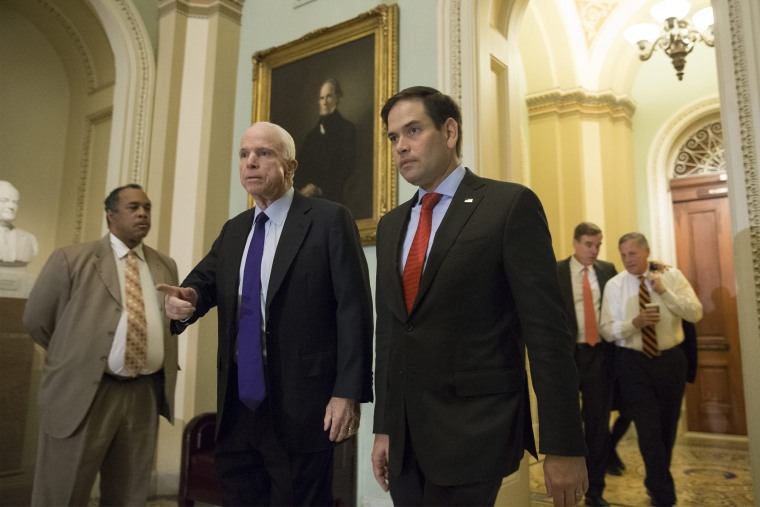TRUMP AGENDA: Tax bill hits a roadblock in the Senate
The big question in Washington: Will the tax bill have the votes? From NBC’s Benjy Sarlin: “Just days before an expected vote, the sweeping Republican tax bill's fate was up in the air Thursday, with few details confirmed and key senators withholding support unless changes were made. Sen. Marco Rubio, R-Fla., announced he would oppose the bill unless it expanded a child tax credit to millions of lower income families by making a larger portion refundable against payroll taxes… [H]uge questions remained as of Thursday afternoon: How many tax brackets would there be and where would the income thresholds be set? How would new benefits, like the lower top rate, be financed? Which provisions would be permanent and which ones would expire? Which ones would be immediate and which ones would phase in and out over time?... Pressure is high to complete a deal in the next week, before newly elected Democrat Doug Jones of Alabama replaces Republican Sen. Luther Strange, which would narrow their margin of error to one.”
NBC’s Maggie Fox looks at the health insurance implications of the bill.
In the New York Times: “Republican negotiators responsible for merging the two bills have made a host of changes to assuage the concerns of businesses and some fellow lawmakers. Those tweaks, which include eliminating the corporate alternative minimum tax and dropping the top individual tax rate to 37 percent from the current rate of 39.6 percent, are expected to drive up the cost of the bill and will need to be paid for to stay in the $1.5 trillion box.”
And in the Washington Post: “Trump and Rubio have a history. They faced off during the GOP primary in 2015 and 2016 and launched nasty, personal attacks against each other. Rubio is seen as considering a future presidential run. He has never fully embraced the type of bare-knuckle politics that Trump likes to employ, even saying he regretted efforts during the campaign to mirror Trump’s attacks.”
“As the largest tax rewrite in decades powered through Congress, lobbyists found themselves sprinting to keep up and find ways to persuade, influence or cajole the small group of lawmakers empowered to tweak language in the final version of the joint Senate and House bill,” writes the New York Times.
POLITICO walks us through what exactly is happening with CHIP.
NBC’s Ali Vitali reports that Omarosa Manigault Newman’s departure raises questions about diversity in the White House.
“With the rapidly shifting cultural and political environment on sexual misconduct evident in the defeat of Roy Moore in Alabama and the quick resignations of multiple lawmakers, Democrats — led by women in the party — are intensifying their efforts to draw attention to Mr. Trump’s own history of accusations made against him by a number of women who say he groped or sexually harassed and abused them,” notes the Washington Post.
POLITICO: “Members of Congress and government watchdogs are questioning why a little-known House agency used taxpayer funds to investigate a sexual harassment complaint involving Rep. Blake Farenthold’s office last year, and then failed to make the results public. The Office of House Employment Counsel operates under the auspices of the House clerk’s office and advises members on employment practices. It also facilitates investigations into employee complaints, a spokesperson confirmed to POLITICO. But what happens afterward is murky: The office appears to serve House members and their offices -- not necessarily the employees -- and makes no public accounting of its determinations or its expenditures.”
“A broad coalition of public officials, activists and content producers vowed to hit Control-Alt-Delete on the Federal Communications Commission's vote Thursday to end "net neutrality" rules intended to make sure that all internet traffic is treated equally,” NBC’s Jo Ling Kent and Alex Johnson write.
The Washington Post reports on the “deep distrust” between Rex Tillerson and the White House.
In the Wall Street Journal: “Deutsche Bank AG earlier this year flagged around $30 million in potentially suspicious transactions as part of an internal investigation into its role as a conduit for money involving Paul Manafort or people and entities connected to him, according to a person briefed on the matter.”
OFF TO THE RACES: Senate control for 2018 is now a tossup
Alex Seitz-Wald writes that Democrats have figured out how to raise a lot of money off of Donald Trump.
The New York Times: “At this time last year, the Democratic path to Senate control seemed impossible: Hold all of the Democratic seats, flip Arizona and Nevada, then hope for a miracle. The Democrats got the political version of a miracle on Tuesday. Doug Jones’s victory in Alabama means Democrats have accomplished the most difficult item on their checklist in pursuit of the Senate. A Democratic path is now obvious, and the race for control is basically a tossup, perhaps with a Republican advantage.”
SC-GOV: A new poll shows Henry McMaster in the lead, but Templeton has the potential to gain ground.
TX-27: Blake Farenthold won’t seek reelection.
VA: “Del. Tim Hugo, a member of Virginia’s House Republican leadership, has been narrowly re-elected to represent parts of Fairfax and Prince William counties, a recount confirmed Thursday… It is the first of four House recounts to be completed that will determine whether Republicans maintain control of the chamber that they had held 66-34 before Nov. 7.”
